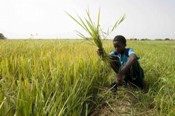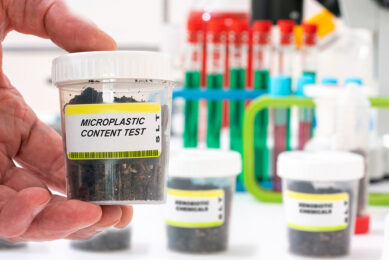New rice variety through spontaneous cross breeding

Through spontaneous cross-breeding in the field between African and Asian rice cultivars, rice farmers in West Africa have developed a new type of rice according to Wageningen University in the Netherlands.
Farmers in West Africa have two sorts of rice at their disposal: Asian rice with high potential yields and African rice, which is better adapted to local conditions. Rice is self-pollinating, which means there is no cross-pollination as a rule. Yet there is still a 0.5% chance of cross-pollination occurring, says Dr. Edwin Nuijten from the Chair Group Technology and agrarian development (TAO), who is involved in the research. After enough generations, this cross-breeding leads to new plants. Farmers have kept aside seed from these new plants, sown them again and exchanged the seeds. Like this, varieties of this new rice type have quietly spread through the region.
The Wageningen researchers used molecular techniques to show that the new hybrid was genetically different to African and Asian rice. The new type of rice gives fairly stable yields and has a short growing season, making it suitable for the short rainy season in Gambia and Senegal, says Nuijten. The hybrid is also well-adapted to the poor West African soils.
Nuijten and his colleagues found closely related varieties of this hybrid in Sierra Leone, Gambia, Guinee Bissau, Guinee Conakry and Senegal. He guesses that the hybrid has emerged spontaneously in several countries, leading to a group of hybrids with the same genetic basis. The researchers are still puzzling over a rice variety developed by farmers in Ghana and Togo, which differs not only from known Asian and African rice varieties, but also from the hybrids in the neighbouring countries. They have not yet managed to trace the starting material for this variety.
As well as TAO, the Plant Physiology chair group and the Netherlands Centre for Genetic Resources (CGN) are also involved in the research, financed by the NWO programme WOTRO, which supports scientific research on development issues. Policymakers and donors should pay more attention to knowledge development and exchange, according to the researchers, who talk of unsupervised learning. This is in contrast to supervised learning, in which plant breeders and scientists tell farmers what to do. ‘It is important to link research with farmers’ knowledge’, says Nuijten, ‘in order to get a better idea of what farmers need. For instance, we are now finding out from the farmers concerned whether we can improve these new rice varieties in any way, or whether we can help with the process of exchange.’
[Source: Resource]











